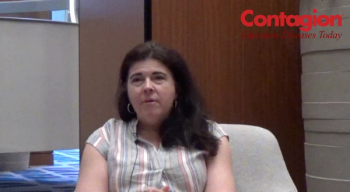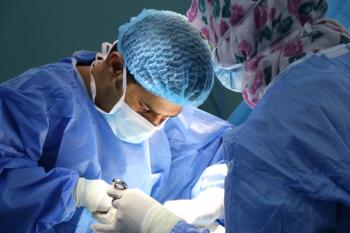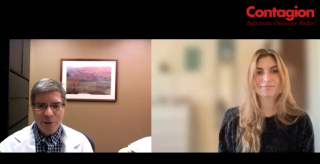
C. Difficile
Latest News
Latest Videos

CME Content
More News

Colleen R. Kelly, MD, FACG, speaks at MAD-ID 2022 on alternatives to antibiotics for C diff infection, including the use of probiotics and fecal microbiota transplantation.

Tend, a startup company, has developed its Gut Microbiome Collect and Prep (CAP) to enable a standardized method for stool (microbiome) encapsulation for the procedure.

Most of the discussion around fecal microbiota transplantation has focused on bacterial communities, but new advances have shed more light on the role of the virome.

Antibiotic-resistant strains of the dangerous superbug C difficile have been identified in pigs and humans, suggesting zoonotic transmission is possible.

Improving stool sample collecting and testing reduced C difficile underdiagnosis.

About 65% of patients with metronidazole-resistant recurrent C difficile infection benefitted from taking rifaximin.

In a mouse model, the product protected against C difficile without eliminating the antibiotic’s presence in the blood.

The greatest risk factors for recurrent Clostridioides difficile infection (CDI) were age of at least 65 years, severe primary CDI, and use of non-CDI antibiotics. Patients with these risk factors should be prioritized for bezlotoxumab therapy.

The technology platform could speed up the development of novel therapeutics to combat virulence.

Concomitant antibiotic (CA) use for infection treatment is a major risk factor for recurrent C difficile infection. One SHEA 2022 study examined whether fidaxomicin or vancomycin would be more beneficial for CA patients.

A study found that hospital providers who prescribe unnecessarily high rates of antibiotics are likely to continue doing so over time.

In a small retrospective study, 7 of 11 patients experienced clinical improvement.

The risk of a community-acquired C difficile infection was 7-fold higher for outpatients with antibiotic exposure.

Nearly 8 in 10 patients with recurrent C. diff. Infection were successfully treated after up to 2 doses of the microbiota-based therapy.

In a case series of 18 patients, all but 3 were cured by single-donor fecal microbiota transplantation capsule therapy.

Finch Therapeutics said it is providing information to the Food and Drug Administration to explain its testing protocols.

The product is designed to eliminate some of the drawbacks of fecal microbiota transplantation.

A new report based on samples from Texas and Kenya found significant proportions of samples from patients with CDI had nonsusceptible isolates.

The company’s investigational PF-06425090 vaccine did show benefits including decreased median infection period and no hospitalizations in the vaccinated cohort.

For the first time, a research team mapped C difficile’s outer “S-layer,” finding the dangerous bacteria’s chainmail-like shell enables it to be highly resistant.

To reduce antimicrobial resistant pathogens, nursing homes should carefully monitor their use of hospital-grade antibiotics.

While Clostridioides difficile infection (CDI) risk appeared to drop, investigators said the overall risk of infection among patients was not changed in a statistically significant way.

Hospitals with lower c difficile antibiotic usage averaged shorter length-of-stay than hospitals that prescribed more antibiotics.

A new orally delivered investigational therapy could help curb the costly and often recurring infection.

The results of the prospective study diverge from published retrospective studies.











































































































































